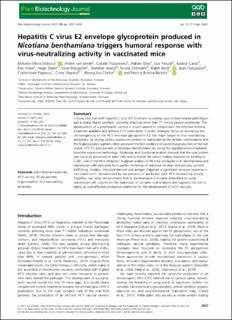| dc.contributor.author | Dobrica, Mihaela-Olivia | |
| dc.contributor.author | van Eerde, André | |
| dc.contributor.author | Tucureanu, Catalin | |
| dc.contributor.author | Onu, Adrian | |
| dc.contributor.author | Paruch, Lisa | |
| dc.contributor.author | Caras, Iuliana | |
| dc.contributor.author | Vlase, Ene | |
| dc.contributor.author | Steen, Hege | |
| dc.contributor.author | Haugslien, Sissel | |
| dc.contributor.author | Alonzi, Dominic | |
| dc.contributor.author | Zitzmann, Nicole | |
| dc.contributor.author | Bock, Ralph | |
| dc.contributor.author | Dubuisson, Jean | |
| dc.contributor.author | Popescu, Costin-Ioan | |
| dc.contributor.author | Stavaru, Crina | |
| dc.contributor.author | Clarke, Jihong Liu | |
| dc.contributor.author | Branza-Nichita, Norica | |
| dc.date.accessioned | 2021-10-14T13:01:50Z | |
| dc.date.available | 2021-10-14T13:01:50Z | |
| dc.date.created | 2021-06-02T10:19:01Z | |
| dc.date.issued | 2021-05-18 | |
| dc.identifier.citation | Plant Biotechnology Journal. 2021, . | en_US |
| dc.identifier.issn | 1467-7644 | |
| dc.identifier.uri | https://hdl.handle.net/11250/2823088 | |
| dc.description.abstract | Chronic infection with hepatitis C virus (HCV) remains a leading cause of liver-related pathologies and a global health problem, currently affecting more than 71 million people worldwide. The development of a prophylactic vaccine is much needed to complement the effective antiviral treatment available and achieve HCV eradication. Current strategies focus on increasing the immunogenicity of the HCV envelope glycoprotein E2, the major target of virus-neutralizing antibodies, by testing various expression systems or manipulating the protein conformation and the N-glycosylation pattern. Here we report the first evidence of successful production of the full-length HCV E2 glycoprotein in Nicotiana benthamiana, by using the Agrobacterium-mediated transient expression technology. Molecular and functional analysis showed that the viral protein was correctly processed in plant cells and achieved the native folding required for binding to CD81, one of the HCV receptors. N-glycan analysis of HCV-E2 produced in N. benthamiana and mammalian cells indicated host-specific trimming of mannose residues and possibly, protein trafficking. Notably, the plant-derived viral antigen triggered a significant immune response in vaccinated mice, characterized by the presence of antibodies with HCV-neutralizing activity. Together, our study demonstrates that N. benthamiana is a viable alternative to costly mammalian cell cultures for the expression of complex viral antigens and supports the use of plants as cost-effective production platforms for the development of HCV vaccines. | en_US |
| dc.language.iso | eng | en_US |
| dc.publisher | John Wiley & Sons Ltd. | en_US |
| dc.rights | Navngivelse-Ikkekommersiell 4.0 Internasjonal | * |
| dc.rights.uri | http://creativecommons.org/licenses/by-nc/4.0/deed.no | * |
| dc.title | Hepatitis C virus E2 envelope glycoprotein produced in Nicotiana benthamiana triggers humoral response with virus-neutralizing activity in vaccinated mice | en_US |
| dc.type | Peer reviewed | en_US |
| dc.type | Journal article | en_US |
| dc.description.version | publishedVersion | en_US |
| dc.rights.holder | © 2021 The Authors | en_US |
| dc.source.pagenumber | 2027-2039 | en_US |
| dc.source.volume | 19 | en_US |
| dc.source.journal | Plant Biotechnology Journal | en_US |
| dc.source.issue | 10 | en_US |
| dc.identifier.doi | 10.1111/PBI.13631 | |
| dc.identifier.cristin | 1913198 | |
| cristin.ispublished | true | |
| cristin.fulltext | original | |
| cristin.qualitycode | 2 | |

